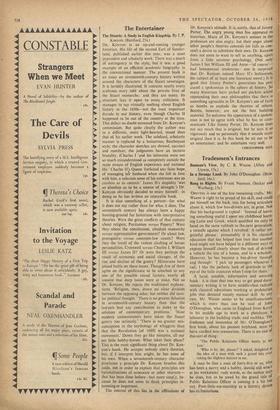The Entertainer
The Stuarts: A Study in English Kingship. By J. P. Kenyon. (Batsford, 25s.)
DR. KENYON is an up-and-coming younger historian. His life of the second Earl of Sunder- land, published earlier this .year, was a most impressive and scholarly work. There was a touch of astringency in the style; but it was a good example of an efficient academic biography in the conventional manner. The present book is an essay on seventeenth-century history written around the characters of the Stuart sovereigns. It is lavishly illustrated. It contains nearly every scabrous story told about the private lives of the Stuart monarchs: and they are many. Its g structure lays it open to many criticisms. It manages to say virtually nothing about English history in the 1650s—not the least important decade in our history, even though Charles H happened to be out of the country at the time. This defect no doubt stemmed from Dr. Kenyon's commission. But quite clearly the author was in a different, more light-hearted, mood than that of his earlier work. The subdued, scholarly manner is replaced by a boisterous, flamboyant style; the character sketches are shrewd, succinct and mordant; the judgments have .an incisive brutality. (Charles I 'and his intimates were not so much misunderstood as completely outside the main stream of English experience and national life.' Charles ll'is Queen 'forfeited any faint hope. of managing her husband when she fell in love with him, a solecism none of his mistresses was so careless as to commit.' James II's stupidity 'was so absolute as to be a source of strength.') Dr. Kenyon obviously decided to enjoy himself: in doing so he has written an enjoyable book.
It is also something of a portent—for what it does not say rather than for what it does. The seventeenth century has always been a happy hunting-ground for historians with interpretative theories. Were the great conflicts of that century about religion, Puritanism versus Popery? Were they about the constitution, absolute monarchy versus representative government? Or about law, prerogative versus common-law courts? Were they the result of the violent clashing of heroic personalities, Cromwell versus Charles!, William lii versus James II? Or were they perhaps the result of economic and social changes, of the rise and decline of the gentry? Historians have joined battle on these issues. Though few of them agree on the significance to be attached to any one of the possible causal factors, nearly all assume that deep issues were at stake. Not so Dr. Kenyon. He rejects the traditional explana- tions. 'Religion, then, drove no clear division between the opposing sides; but neither did secu- lar political thought.' There is no greater delusion in seventeenth-century history than that the lawyers had any contribution to make to the solution of contemporary problems.' Most modern commentators have taken the Stuart gentry too seriously.' There is no greater mis- conception in the mythology of whiggism than that the Revolution [of 1688] was a national movement.' Down they go like ninepins, all our pet little hobby-horses. What takes their place? This is the most significant thing about Dr. Ken- yon's book. He accepts nobody else's theories, but, if I interpret him aright, he has none of his own. When a seventeenth-century character proclaims a principle Dr. Kenyon brushes this aside, not in order to explain that principles are rationalisations of economic or other interests— that has been done before—but more simp:y, be- cause he does not seem to think principles in- teresting or important.
The interest of this lies in the affiliations of
Dr. Kenyon's attitude. It is, surely, that of Jimmy Porter. The angry young man has appeared as historian. Many of Dr. Kenyon's seniors in the profession are also angry; but their anger about other people's theories conceals (or fails to con- ceal) a desire to substitute their own. Dr. Kenyon does not seem to want to sell us anything, apart from a little amateur psychology. (Not onlY James I but William III and Anne—`of course'— had homosexual tendencies: one is surprised that Dr. Kenyon missed Mary 11's lesbianism, the subject of at least one historical novel.) It is good that Jimmy Porter's generation has pro- duced a spokesman in the sphere of history. So many historians have picked our pockets whilst expounding their own philosophies that there Is something agreeable in Dr. Kenyon's use of facts as bombs to explode the theories of others. Bombs, however, are not the best building material. To welcome the appearance of a spokes- man is not to agree with what he has to com- municate. Like Jimmy Porter, Dr. Kenyon does not say much that is original; but he says it so vigorously and so personally that it sounds more original than it is. In this book he set out to be an entertainer; and he entertains very well.
CHRISTOPHER LULL


































 Previous page
Previous page